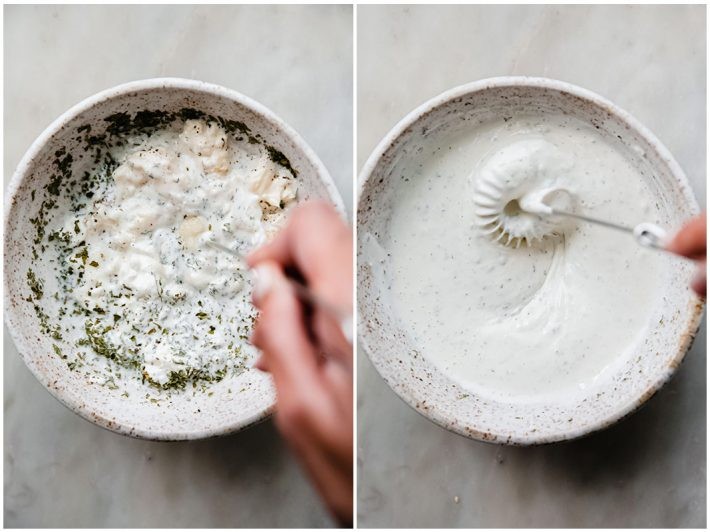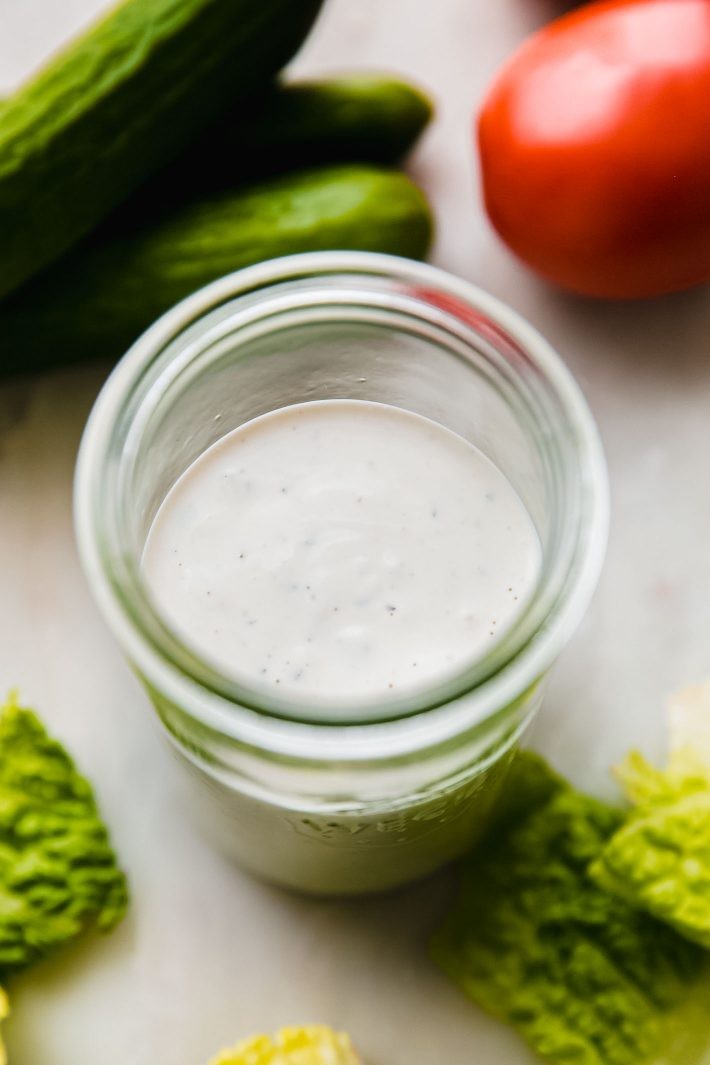Craving that creamy, tangy, and utterly addictive white sauce that elevates Halal food to another level? FOODS.EDU.VN brings you the ultimate guide on how to make halal cart white sauce, ensuring your homemade Halal bowls taste just like your favorite street vendor’s. Get ready to unlock the secrets to this versatile and delicious topping, perfect for everything from chicken and rice to falafel and beyond. Discover creamy textures, zesty flavors, and the perfect balance of spices with our expert tips and tricks.
1. Unveiling the Magic: What is Halal White Sauce?
Halal white sauce, often associated with New York City’s famous Halal food carts, is a creamy, tangy, and slightly sweet condiment that complements various dishes, particularly chicken and rice. Its unique flavor profile sets it apart from other sauces, making it a beloved addition to Halal cuisine. The sauce’s origins are rooted in Middle Eastern and Mediterranean flavors, adapted and popularized by Halal food vendors in urban areas.
- The Appeal: Its creamy texture and tangy flavor balance the richness of the meat and rice, creating a harmonious and satisfying meal.
- Versatility: This sauce isn’t just for chicken and rice; it’s also delicious on gyros, falafel, shawarma, and even as a dip for vegetables.
- Halal Compliance: Made with Halal-certified ingredients, ensuring it adheres to Islamic dietary guidelines.
2. Why Make Your Own Halal White Sauce?
While you can find pre-made versions in some stores, crafting your own Halal white sauce offers numerous advantages:
- Control Over Ingredients: Ensure all ingredients are Halal-certified and free from unwanted additives or preservatives.
- Customization: Adjust the flavors to your liking, tweaking the tanginess, sweetness, or spice level.
- Freshness: Homemade sauce always tastes better than store-bought, with vibrant flavors that haven’t been dulled by preservatives.
- Cost-Effective: Making your own sauce is often cheaper than buying it pre-made, especially if you frequently use it.
3. Essential Ingredients: The Foundation of Flavor
Creating authentic Halal white sauce requires a specific blend of ingredients. Here’s a breakdown of the key components:
| Ingredient | Purpose | Notes |
|---|---|---|
| Mayonnaise | Provides the creamy base and richness. | Use a good quality, full-fat mayonnaise for the best flavor and texture. Ensure it’s Halal-certified. |
| Sour Cream | Adds tanginess and creaminess, contributing to the sauce’s signature flavor. | Full-fat sour cream is recommended, but you can use light sour cream or plain yogurt for a lighter version. |
| White Vinegar | Provides a sharp tanginess that balances the richness of the mayonnaise and sour cream. | Distilled white vinegar is preferred for its clean flavor, but apple cider vinegar can be used as a substitute. |
| Lemon Juice | Adds brightness and acidity, complementing the other tangy ingredients. | Freshly squeezed lemon juice is always best for its vibrant flavor. |
| Sugar | Balances the acidity and enhances the overall flavor profile. | Granulated sugar is typically used, but you can also use honey or maple syrup for a different flavor dimension. |
| Dried Parsley | Adds a subtle herbal note and visual appeal. | Fresh parsley can be used, but dried parsley is more convenient and has a longer shelf life. |
| Salt and Pepper | Enhances the flavors and provides seasoning. | Use kosher salt and freshly ground black pepper for the best flavor. |
| Optional Ingredients | ||
| Garlic Powder | Adds a subtle garlic flavor. | Use sparingly, as too much garlic powder can overpower the other flavors. |
| Onion Powder | Provides a mild onion flavor. | Similar to garlic powder, use sparingly. |
| Cayenne Pepper | Adds a touch of heat. | Use a pinch for a subtle kick, or more for a spicier sauce. |


4. Step-by-Step Guide: Crafting the Perfect Halal White Sauce
Follow these simple steps to create your own delicious Halal white sauce at home:
- Combine Ingredients: In a medium bowl, combine the mayonnaise, sour cream, white vinegar, lemon juice, sugar, dried parsley, salt, and pepper.
- Whisk Thoroughly: Whisk all ingredients together until smooth and well combined. Ensure there are no lumps.
- Adjust to Taste: Taste the sauce and adjust the seasoning as needed. Add more sugar for sweetness, vinegar for tanginess, or salt and pepper for overall flavor.
- Chill: Cover the bowl and refrigerate the sauce for at least 30 minutes to allow the flavors to meld together.
- Serve: Serve the sauce chilled over your favorite Halal dishes, such as chicken and rice, gyros, or falafel.
5. Tips and Tricks for Halal White Sauce Perfection
- Use High-Quality Mayonnaise: The quality of the mayonnaise significantly impacts the flavor of the sauce. Opt for a brand you trust and enjoy.
- Don’t Over-Whisk: Over-whisking can cause the sauce to become too thin. Whisk until just combined.
- Adjust Sweetness Gradually: Add sugar a little at a time, tasting as you go, to avoid making the sauce too sweet.
- Let it Rest: Chilling the sauce allows the flavors to meld together, resulting in a more cohesive and flavorful sauce.
- Experiment with Flavors: Don’t be afraid to experiment with different herbs and spices to create your own unique version of Halal white sauce.
6. Variations and Adaptations: Making It Your Own
- Spicy Halal White Sauce: Add a pinch of cayenne pepper or a dash of hot sauce for a spicy kick.
- Garlic Halal White Sauce: Add a clove of minced garlic or 1/4 teaspoon of garlic powder for a garlicky flavor.
- Herby Halal White Sauce: Experiment with different fresh or dried herbs, such as dill, mint, or cilantro.
- Vegan Halal White Sauce: Use vegan mayonnaise and sour cream alternatives to create a plant-based version of the sauce.
- Lighter Halal White Sauce: Substitute light sour cream or plain yogurt for the full-fat sour cream to reduce the calorie content.
7. Serving Suggestions: Beyond Chicken and Rice
Halal white sauce is incredibly versatile and can be used in various ways:
- As a Topping: Drizzle it over chicken and rice, gyros, falafel, shawarma, or kebabs.
- As a Dip: Serve it as a dip for vegetables, pita bread, or fries.
- As a Dressing: Use it as a dressing for salads or grain bowls.
- As a Condiment: Spread it on sandwiches, wraps, or burgers.
- As a Marinade: Marinate chicken or lamb in the sauce for added flavor and tenderness.
8. Halal Considerations: Ensuring Compliance
When making Halal white sauce, it’s crucial to ensure all ingredients are Halal-certified. Look for Halal symbols on packaging or consult with a trusted Halal food authority if you’re unsure. Some key considerations include:
- Mayonnaise: Ensure the mayonnaise is made without any non-Halal ingredients, such as pork-derived enzymes.
- Vinegar: While most vinegar is Halal, some flavored vinegars may contain non-Halal ingredients.
- Other Additives: Check for any emulsifiers, stabilizers, or preservatives that may not be Halal-compliant.
By carefully selecting your ingredients, you can ensure your Halal white sauce adheres to Islamic dietary guidelines.
9. Health Benefits: More Than Just Flavor
While Halal white sauce is often enjoyed for its delicious taste, it also offers some potential health benefits:
- Source of Healthy Fats: Mayonnaise and sour cream contain healthy fats that are essential for brain function and hormone production.
- Source of Protein: Sour cream provides a small amount of protein, which is important for building and repairing tissues.
- Source of Vitamins and Minerals: Lemon juice and parsley are good sources of vitamins and minerals, such as vitamin C and potassium.
- Can be Made Lighter: By using light sour cream or plain yogurt, you can reduce the calorie and fat content of the sauce.
However, it’s important to consume Halal white sauce in moderation, as it can be high in calories and fat.
10. Storage and Shelf Life: Keeping It Fresh
Halal white sauce should be stored in an airtight container in the refrigerator. It will typically last for up to 5 days. Be sure to label the container with the date it was made.
- Freezing: Freezing is not recommended, as the sauce may separate and become watery when thawed.
- Signs of Spoilage: Discard the sauce if it develops an off odor, changes color, or shows signs of mold growth.
11. Troubleshooting: Common Issues and Solutions
- Sauce is Too Thick: Add a tablespoon of water or lemon juice at a time until it reaches the desired consistency.
- Sauce is Too Thin: Add a tablespoon of mayonnaise or sour cream at a time until it thickens.
- Sauce is Too Tangy: Add more sugar to balance the acidity.
- Sauce is Too Sweet: Add more vinegar or lemon juice to balance the sweetness.
- Sauce is Bland: Add more salt, pepper, or other spices to enhance the flavor.
12. The Halal Food Scene: A Global Phenomenon
Halal food is a growing global market, driven by the increasing Muslim population and the rising awareness of Halal dietary guidelines. Halal food carts and restaurants are popular in many urban areas, offering a convenient and affordable way to enjoy Halal cuisine.
- Market Growth: The global Halal food market is estimated to be worth trillions of dollars.
- Cultural Significance: Halal food is an important part of Islamic culture and tradition.
- Diverse Cuisine: Halal cuisine encompasses a wide range of dishes from around the world.
- Ethical Considerations: Halal food production emphasizes ethical and humane treatment of animals.
13. Halal Certification: Ensuring Authenticity
Halal certification is a process that verifies that food products and processes meet Halal standards. Certified products are labeled with a Halal symbol, which assures Muslim consumers that the food is permissible to eat.
- Certification Bodies: Various Halal certification bodies operate worldwide, each with its own standards and procedures.
- Ingredient Verification: Certification involves verifying that all ingredients used in the product are Halal-compliant.
- Process Verification: Certification also involves verifying that the production process meets Halal standards, such as avoiding cross-contamination with non-Halal products.
- Consumer Confidence: Halal certification provides consumers with confidence that the food they are buying is truly Halal.
14. Halal White Sauce and Cultural Fusion
Halal white sauce exemplifies cultural fusion, blending Middle Eastern flavors with Western culinary techniques. It’s a testament to how food can transcend cultural boundaries and create something new and delicious.
- Adaptation and Innovation: The sauce has evolved over time, with different variations and adaptations emerging in different regions.
- Culinary Exchange: Halal food carts have introduced many people to Middle Eastern and Mediterranean flavors, fostering culinary exchange and appreciation.
- Diversity and Inclusion: Halal cuisine celebrates diversity and inclusivity, welcoming people of all backgrounds to enjoy its delicious flavors.
15. Halal White Sauce: A Staple for Every Home Cook
Mastering how to make the best white sauce for Halal food opens doors to a world of culinary possibilities. From quick weeknight dinners to elaborate weekend feasts, this sauce is a versatile ingredient that will elevate your cooking.
- Enhance Your Recipes: Use it to add flavor and richness to a variety of dishes.
- Impress Your Guests: Serve it at your next gathering and watch your guests rave about its delicious taste.
- Explore New Flavors: Experiment with different variations and adaptations to create your own signature Halal white sauce.
16. Expert Tips for Achieving Creamy Perfection
- Use Room Temperature Ingredients: Allowing your sour cream and mayonnaise to sit at room temperature for about 15-20 minutes before mixing can help create a smoother, more homogenous sauce.
- Emulsify Properly: Ensure the mayonnaise and sour cream are fully emulsified with the acidic ingredients (vinegar and lemon juice). This prevents separation and maintains a creamy texture.
- Avoid Overmixing: Overmixing can lead to a thin or watery sauce. Mix gently until just combined.
- Taste and Adjust Throughout: Taste the sauce at various stages of preparation and adjust seasonings (salt, pepper, sugar) as needed to achieve the perfect balance of flavors.
- Consider a Food Processor: For an ultra-smooth sauce, you can use a food processor or blender to combine the ingredients. Pulse until the sauce is perfectly creamy.
17. Nutritional Information: A Balanced Perspective
Understanding the nutritional profile of your Halal white sauce can help you make informed dietary choices.
| Nutrient | Amount per Serving (Approximate) | Notes |
|---|---|---|
| Calories | 150-200 | Varies depending on ingredients and serving size. |
| Fat | 15-20g | Primarily from mayonnaise and sour cream. |
| Saturated Fat | 5-8g | Limit intake for heart health. |
| Cholesterol | 20-30mg | Found in mayonnaise and sour cream. |
| Sodium | 100-150mg | Adjust salt to taste. |
| Carbohydrates | 5-8g | From sugar and small amounts in other ingredients. |
| Sugar | 3-5g | Adjust to taste. |
| Protein | 1-2g | Primarily from sour cream. |
| Vitamin C | Trace | From lemon juice. |
| Other Micronutrients | Trace | Depending on ingredients. |
- Moderation is Key: While delicious, Halal white sauce is calorie-dense. Enjoy in moderation as part of a balanced diet.
- Healthy Fats: The fats in mayonnaise and sour cream can be part of a healthy diet, but choose full-fat options wisely.
- Lower Sodium: Be mindful of sodium levels and adjust salt to taste.
- Homemade Advantage: Making your own sauce allows you to control the ingredients and nutritional content.
18. Frequently Asked Questions (FAQs)
- Can I use light mayonnaise or sour cream to make the sauce healthier? Yes, you can substitute light versions to reduce calories and fat, but the flavor and texture may be slightly different.
- How long does Halal white sauce last in the refrigerator? Properly stored, it will last up to 5 days in the refrigerator.
- Can I freeze Halal white sauce? Freezing is not recommended as it can alter the texture and cause separation.
- What can I do if my sauce is too thick? Add a little water or lemon juice to thin it out.
- What if my sauce is too tangy? Add a pinch more sugar to balance the acidity.
- Is there a substitute for sour cream? Plain yogurt (full-fat or Greek) can be used as a substitute, but it will alter the flavor slightly.
- Can I add other herbs or spices to the sauce? Absolutely! Experiment with garlic powder, onion powder, dill, or paprika to customize the flavor.
- Is this sauce gluten-free? Yes, as long as all the ingredients you use are gluten-free.
- Can I make this sauce vegan? Yes, use vegan mayonnaise and sour cream alternatives to create a plant-based version.
- Where can I find Halal-certified mayonnaise and sour cream? Check your local Halal markets or specialty grocery stores. Many mainstream brands also offer Halal-certified options.
19. Modern Twists on a Classic: Innovative Halal White Sauce Recipes
- Smoked Paprika Halal White Sauce: Add 1/2 teaspoon of smoked paprika for a smoky depth.
- Jalapeño Lime Halal White Sauce: Incorporate finely minced jalapeño and lime zest for a spicy, citrusy kick.
- Roasted Garlic Halal White Sauce: Use roasted garlic cloves for a mellow, sweet garlic flavor.
- Curry Powder Halal White Sauce: Add a touch of curry powder for an exotic, aromatic twist.
- Sun-Dried Tomato Halal White Sauce: Blend in oil-packed sun-dried tomatoes for a tangy, umami-rich flavor.
20. FOODS.EDU.VN: Your Gateway to Halal Culinary Excellence
At FOODS.EDU.VN, we’re passionate about providing you with the knowledge and resources you need to create delicious and authentic Halal meals at home.
- Explore a Wide Range of Halal Recipes: From traditional dishes to modern fusion creations, we have something for every palate.
- Learn from Expert Chefs and Food Professionals: Our team of experts shares their tips, tricks, and techniques to help you master Halal cuisine.
- Discover the Best Halal Ingredients: We guide you to the best sources for Halal-certified ingredients, ensuring the authenticity of your dishes.
- Join a Community of Food Lovers: Connect with other Halal food enthusiasts, share your recipes, and learn from each other.
Ready to embark on a Halal culinary adventure? Visit FOODS.EDU.VN today and unlock a world of delicious possibilities!
21. The Future of Halal Cuisine: Trends and Innovations
The Halal food industry is constantly evolving, with new trends and innovations emerging all the time.
- Plant-Based Halal: The growing demand for plant-based options is driving the development of new Halal-certified vegan and vegetarian products.
- Sustainable Halal: Consumers are increasingly interested in sustainable and ethically sourced Halal food.
- Halal Convenience Foods: The market for Halal ready-to-eat meals and snacks is expanding rapidly.
- Halal Food Technology: Innovations in food technology are improving the quality, safety, and availability of Halal food.
- Halal Culinary Tourism: Halal culinary tourism is becoming increasingly popular, with travelers seeking out authentic Halal food experiences around the world.
22. Essential Equipment for Halal White Sauce Success
While making Halal white sauce is relatively simple, having the right equipment can make the process even easier and more enjoyable.
| Equipment | Description | Benefits |
|---|---|---|
| Mixing Bowls | A set of various-sized bowls for combining ingredients. | Allows for easy mixing and prevents overcrowding. |
| Whisk | A sturdy whisk for blending the sauce ingredients. | Ensures a smooth and homogenous sauce. |
| Measuring Cups/Spoons | Accurate measuring tools for precise ingredient ratios. | Essential for consistent results and flavor balance. |
| Lemon Juicer | A tool for extracting juice from lemons. | Makes juicing lemons quick and efficient. |
| Airtight Containers | Containers for storing the finished sauce. | Keeps the sauce fresh and prevents it from absorbing odors in the refrigerator. |
| Food Processor (Optional) | A food processor or blender for an ultra-smooth sauce. | Creates a perfectly creamy texture, especially useful if you want to incorporate fresh herbs or roasted garlic. |
| Squeeze Bottle (Optional) | A squeeze bottle for easy dispensing of the sauce. | Convenient for drizzling the sauce over dishes. |
23. Halal White Sauce Around the World: Regional Variations
While the basic recipe for Halal white sauce remains consistent, regional variations exist, reflecting local tastes and ingredients.
- Middle East: Some variations incorporate tahini (sesame seed paste) for added richness and nutty flavor.
- Mediterranean: Olive oil may be used in place of some or all of the mayonnaise for a lighter, more Mediterranean flavor.
- Southeast Asia: Lime juice or lemongrass may be added for a citrusy, aromatic twist.
- North Africa: Harissa paste (a spicy chili paste) may be incorporated for a fiery kick.
24. The Science Behind Creamy Sauces: Emulsions Explained
Understanding the science behind emulsions can help you create the perfect creamy sauce every time.
- What is an Emulsion? An emulsion is a mixture of two liquids that don’t normally mix together, such as oil and water.
- How it Works: Emulsifiers, such as egg yolks or mustard, help to stabilize the mixture by surrounding the oil droplets and preventing them from coalescing.
- In Halal White Sauce: Mayonnaise acts as the primary emulsifier, creating a stable emulsion with the other ingredients.
- Tips for Success: Use room temperature ingredients and whisk vigorously to create a strong emulsion. Avoid overmixing, which can break the emulsion.
25. Halal White Sauce Recipe
Yields: About 1.5 cups
Prep time: 5 minutes
Chill time: 30 minutes (recommended)
Ingredients:
- 1 cup Halal-certified mayonnaise
- 1/2 cup Halal-certified sour cream
- 2 tablespoons white vinegar
- 1 tablespoon lemon juice, freshly squeezed
- 1-2 tablespoons granulated sugar (adjust to taste)
- 1 teaspoon dried parsley
- 1/2 teaspoon kosher salt, or to taste
- 1/4 teaspoon black pepper, freshly ground
- Optional: 1/4 teaspoon garlic powder or onion powder, pinch of cayenne pepper
Equipment:
- Medium mixing bowl
- Whisk
- Measuring cups and spoons
Instructions
Get Started:
- Gather all your ingredients and measuring tools.
- Ensure the mayonnaise and sour cream are Halal-certified.
Combine Ingredients:
- In a medium mixing bowl, add the Halal-certified mayonnaise and sour cream.
- Pour in the white vinegar and lemon juice.
Add Seasonings:
- Sprinkle in the dried parsley, kosher salt, and black pepper.
- Add 1 tablespoon of granulated sugar initially.
Mix Thoroughly:
- Using a whisk, blend all the ingredients together until smooth and well combined.
- Ensure there are no lumps and the mixture is homogenous.
Adjust and Taste:
- Taste the sauce and assess its flavor balance.
- If it’s too tangy, add the remaining tablespoon of sugar or more to reach your preferred sweetness.
- If it lacks depth, add a pinch of garlic powder or onion powder. For a spicy kick, incorporate a pinch of cayenne pepper.
Chill:
- Cover the bowl tightly with plastic wrap or transfer the sauce to an airtight container.
- Refrigerate for at least 30 minutes to allow the flavors to meld together. Chilling also helps the sauce thicken slightly.
Serve:
- Once chilled, give the sauce a final stir before serving.
- Serve cold over your favorite Halal dishes such as chicken and rice, gyros, or falafel.
- Enjoy this creamy, tangy, and delicious Halal white sauce!
Notes:
- For a lighter version, use light sour cream or plain yogurt.
- Adjust the amount of sugar based on your preferred level of sweetness.
- Store in an airtight container in the refrigerator for up to 5 days.
This recipe provides a comprehensive guide to creating a flavorful and authentic Halal white sauce that will elevate your homemade Halal dishes.
Remember: Always prioritize Halal-certified ingredients to ensure compliance with Islamic dietary guidelines.
26. Let’s Connect!
Have you tried making your own Halal white sauce? We’d love to hear about your experience! Share your photos and recipes with us on social media using #FOODSEDUHALAL.
For more delicious Halal recipes, cooking tips, and culinary inspiration, visit FOODS.EDU.VN.
FOODS.EDU.VN
Address: 1946 Campus Dr, Hyde Park, NY 12538, United States
WhatsApp: +1 845-452-9600
Website: FOODS.EDU.VN
Discover the best in Halal cuisine with FOODS.EDU.VN!
If you’re facing difficulties finding reliable Halal recipes or struggle with perfecting your culinary skills, remember that FOODS.EDU.VN is here to help. We offer a wide range of detailed recipes, expert cooking advice, and a supportive community to guide you every step of the way. Don’t let culinary challenges hold you back—visit foods.edu.vn today and unlock your potential to create delicious, authentic Halal meals with confidence.

